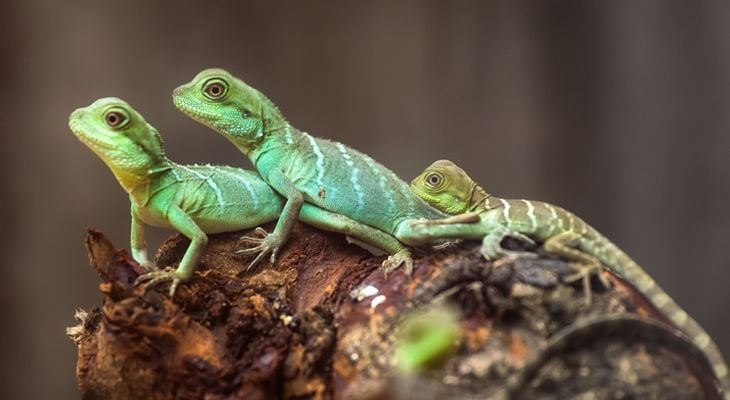Don't let heatstroke or sore paws keep your pet from enjoying the summer.
Read more

People with limited living quarters may find that reptiles such as lizards or turtles fit perfectly into their lifestyles. Before deciding on a reptile, learn as much as possible about them and their needs. Poisonous snakes and certain reptiles should never be kept as pets. Ask your veterinarian about the suitability of a particular animal before you make your decision. There are many things to consider before committing to a reptile as a pet.
Finding out if a Pet is Legal Where You Live
Many areas have enacted laws pertaining to keeping reptiles. Some are general and some are quite specific; in many places any reptiles that are considered dangerous (venomous snakes, alligators, etc.) are illegal but some places are even more restrictive (for example, in some states all constricting snakes including ball pythons are illegal).
Salmonella Risks and Prevention
All reptile owners need to be informed about Salmonella infections. While the risks shouldn't keep most people from keeping reptiles since with the proper management the risks are minimal. Still, owners should be aware of the risks, and the US Centers for Disease Control recommends that certain risk groups should be careful about contact with reptiles and amphibians.
The Importance of Light and Heat
Many problems with keeping reptiles can be traced back to not providing the proper environmental conditions, particularly heat. Proper lighting is also important for many reptiles. The equipment to provide the proper heat and light to captive reptiles is often quite expensive, but is absolutely essential to keeping pet reptiles healthy. It is important to find out exactly what conditions your reptile needs and never cut corners when it comes to meeting those conditions!
Why Choose Captive Bred Reptiles
There are numerous reasons why you should pick a captive bred reptile if at all possible, as explained here.
How to Pick a Healthy Reptile
It is important to keep in mind that depending on where you get a reptile, it may be very stressed, dehydrated, and prone to illness. Here are some items to look for when buying your reptile to increase the chances of picking out a healthy pet reptile.
While there are many types of reptiles that could be good pets, here we cover a few you could consider.
-
Summer Paw Care For Hot Pavement and Exercise Outside
-
Managing Your Cat's Night-Time Activity
Does your cat enjoy midnight sprints through your home? These tips can help curb the behavior.
Read more -
Common Pet Skin Issues and How to Treat Them
Wondering why your pet is scratching? A skin condition may be to blame.
Read more -
Keeping Your Pets Safe During Flea and Tick Season
Would you like to keep your pet free of ticks and fleas? Try a few of these tips.
Read more -
Pawty with Your Pet - National Dog Party Day
Do you have anything planned for National Dog Party Day?
Read more -
Managing Your Pet’s Anxiety
Does your pet suffer from anxiety? These tips can help calm your furry friend.
Read more -
April is National Heartworm Awareness Month
Do you know how to protect your pet from heartworms?
Read more -
Preparing for Kitten Season - Spay and Neuter Your Pets and Keep Them Safe and Indoors
Kitten season will soon be here. Are you ready?
Read more -
How To Avoid A Pet Poisoning
Do you know how to limit your pet's exposure to poisons and toxins?
Read more -
Your New Year's Diet Could Be Deadly To Your Pet - Xylitol Toxicity In Dogs
Could your new diet harm your pet's health?
Read more -
Preparing For Pet Dental Month
Not sure if your pet needs a dental exam? These 10 reasons may help you make a decision.
Read more -
What to Do If Your Pet is Stung
Don't get us wrong, we love the bees! But we don't love when our pets get stung. Follow our tips to treat and prevent bee stings on your furry best friend.
Read more -
Why the Controversy About Pet Vaccinations?
As with anything, pet vaccinations can be too much of a good thing. Similar to parents who are learning more about vaccinations for children, veterinarians and pet owners alike are beginning to question some of the standard wisdom when it comes to protecting pets. There are certain fatal diseases against
Read more -
Introducing a New Pet to Your Current Ones
Are you considering adding another furry companion to your family? If so, have you thought about how your new pet will interact with your current ones? Introducing a new pet into the family is always exciting, but it’s important to make sure that the pets you already have are prepared for the new addition.
Read more -
Is Your Cat's Personality Influenced by Coat Color?
Are orange cats friendlier than black ones? Coat color may play a role in personality.
Read more -
Is a Cat Enclosure Right for Your Cat?
A cat enclosure offers the perfect way for your favorite feline to enjoy a little outdoor time without being subjected to the dangers of the real world. Before you make the decision about adding an enclosure to your property, consider these facts. Free Access to the Outdoors Can Decrease a Cat's Lifespan Free
Read more

